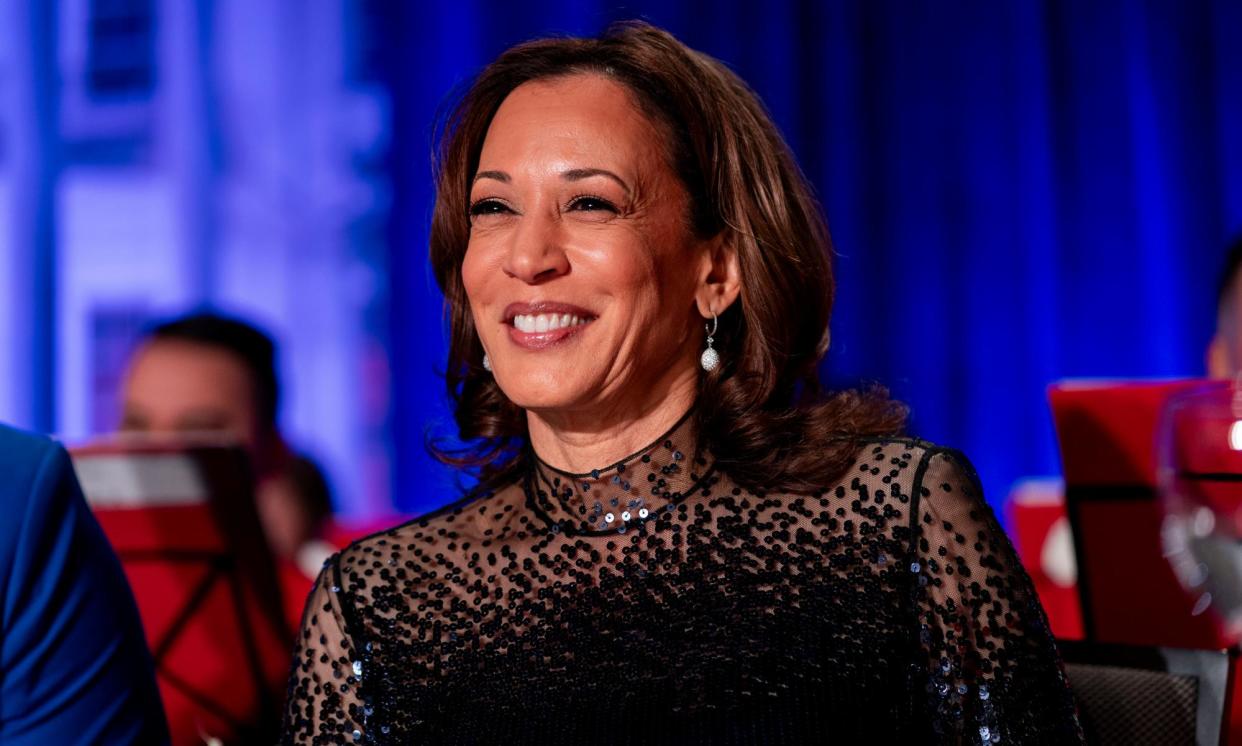Kamala Harris visits Atlanta to tout investments in minority communities

Kamala Harris once again visited Atlanta to tout investments made by the Biden administration in minority and underserved communities, highlighting $158m in infrastructure spending on a project to build a cap over Atlanta’s most traveled highway, the Downtown Connector.
The vice-president’s appearance is the continuation of a full court press in Georgia to solidify support among Democrats – and specifically Black Democrats – for the administration.
Harris has visited Atlanta repeatedly since winning office, acting as one of the administration’s primary surrogates to the Black community, keenly aware that Georgia remains in play and that perceptions of flagging support among African American voters could be the difference between a win and a loss.
Related: How did Kamala Harris go from being a rising star to a damp squib?
Harris kicked off a nationwide tour discussing economic opportunities for minority voters with this visit, she said.
The Atlanta project, which local planners call the Stitch, would build parkland and mixed-use buildings including affordable housing and is meant to address the intentional destruction of Black communities by highway construction in the 60s, Harris said.
“There was this whole policy push called urban renewal,” Harris said. “It was supposed to be about making life easier for people … but essentially it was about making it easier for folks who had wealth and means to move to the suburbs and still have access to downtown. It ended up decimating these communities for years.” Harris said the Stitch project would create an estimated 13,000 jobs and help reconnect a community bifurcated by the highway.
Harris spoke on Monday at the Georgia International convention center near Atlanta’s airport in a conversation moderated by Rashad Bilal and Troy Millings, hosts of the financial podcast Earn Your Leisure. She emphasized the work the Biden administration has been doing to expand access to capital for communities of color.
Black entrepreneurs do not have access to the capital needed to launch capital-intensive companies, Bilal said. “Especially when we look at the next generation of unicorn companies – billion-dollar companies – they’re tech companies,” Bilal said.
That access is often about relationships that Black business owners often do not have. But federal spending can provide a base from which a business can grow and ultimately build those relationships, Harris said. Home ownership is also critical for building intergenerational wealth and entrepreneurial opportunities, as a source of equity for startups.
“To achieve true equality, we must have an economic agenda,” Harris said. “That agenda must mean speaking to people’s economic ambitions.”
Harris’s message sharply contrasts with increasing rhetoric from Republicans decrying diversity, equity and inclusion programs. “In spite of those who want to attack DEI, you can’t truly invest in the strength of our nation if you don’t pay attention to diversity, equity and inclusion.”
Among other programs and spending made by the federal government since 2021, Harris presented the Stitch as an example of what the Biden administration has accomplished.
After federal courts struck down zoning laws that segregated housing, federal legislators responded with the Federal-Aid Highway Act of 1956. Massive highway projects like Atlanta’s Downtown Connector were deliberately driven through Black neighborhoods in the name of “urban renewal”. In Atlanta’s case, the connector – which brings I-75 and I-85 together – displaced residents and businesses around Auburn Avenue, which was the heart of Atlanta’s Black middle class.
Martin Luther King Jr grew up a five-minute walk from where the connector splits the city today, a massive highway with more than 300,000 cars passing through every day. Similarly, the construction of I-20 decimated the Summerhill neighborhood, once home to many of Atlanta’s Black doctors. Summerhill has only recently recovered its economic vibrancy. But even as much of the rest of Atlanta experiences gentrification, the area around Auburn Avenue is poor.
The representative Nikema Williams and the senators Raphael Warnock and Jon Ossoff addressed attendees briefly before the main event, each extolling the virtues of infrastructure investments in Georgia from the infrastructure bill. The Stitch received outsized attention by all three in their remarks.
Williams is in her sophomore term as a congresswoman representing much of Atlanta, and sits on the House transportation committee. She and Warnock worked closely together to draw funding on the Stitch project, which eight years ago was little more than a twinkle in the eye of AJ Robinson, president of Central Atlanta Progress, a non-profit civic group for downtown businesses which is leading the design process on the Stitch.
“We are truly a model for the world,” Williams said, describing the investments by the Biden administration in the Black community as “unprecedented”.
Warnock has a particularly high political stake in the Stitch. The cap stands to transform the area around Auburn Avenue, famed home of Martin Luther King Jr and Ebenezer Baptist church, where Warnock is now senior pastor. The church is two blocks east of the Connector, which decimated the once-vibrant street after its construction about 60 years ago.
“Let’s be very clear, today is a day of celebration,” Warnock said. “Because at last, we start repairing and revitalizing and reconnecting neighborhoods in the heart of the Black neighborhoods that have been historically torn apart by highway construction … This happens in every community in America.”


